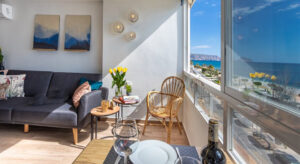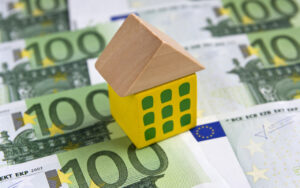
The housing price index in Ukraine reached 112.8% at the end of 2025, compared to 112.7% in 2024 and 114.5% in 2023, according to the State Statistics Service (Derzhstat).
According to its data, housing prices in the primary market rose by 14.3% in 2025, with growth slowing compared to 2024, when the figure was 15%. At the same time, one-room apartments rose in price by 14.6%, two-room apartments by 14.1%, and three-room apartments by 13.2%.
At the same time, housing prices in the secondary market rose last year after falling in 2024. Thus, the secondary market rose by an average of 12%, which is 0.4 percentage points (p.p.) higher than in 2024. One-room apartments on the secondary market rose in price by 12.7%, two-room apartments by 12.1%, and three-room apartments by 11.8%.
According to the agency, in the fourth quarter of 2025, the housing price index was 113.2%, which is almost equal to the figure for the fourth quarter of 2024 (113.1%). In particular, in October-December 2025, prices in the primary market rose by 13.1% compared to 15.8% in October-December 2024, while in the secondary market, the rate of price growth accelerated: the indicator was 13.3% compared to 11.9%, respectively.
In the fourth quarter of 2025, compared to the third quarter, the housing price index rose by 4.4 percentage points to 104.7%. In particular, housing prices in the primary market rose by an average of 4.3%: one-room apartments by 4.8%, two-room apartments by 4.2%, and three-room apartments by 3.7%.
In the secondary market, housing prices rose by 5% in the fourth quarter of 2025, compared to 0.3% in the third quarter. One-room apartments rose in price by 5.6%, two- and three-room apartments by 5% and 4.5%, respectively.

As reported by Serbian Economist, the average price of 1 square meter of housing in new buildings in Montenegro in the IV quarter of 2025 amounted to 2 206 euros, which is 14% higher than the level of the IV quarter of 2024 (1 936 euros), according to data from MONSTAT.
The growth was uneven by region. On the coast, the average price reached EUR 2,570 per sqm (approximately +24% y/y), in Podgorica – EUR 2,141 (+10%), in the central region – EUR 1,363 (growth from a low base, approximately +46%), while the northern region did not record new building sales in Q4 2025.
The dynamics during 2025 were in waves: the national average price was €2,158 in Q1, €2,201 in Q2, €2,228 in Q3 and €2,206 in Q4, meaning that after peaking in the summer, the figure fell slightly towards the end of the year.
MONSTAT separately emphasizes that the average price is strongly influenced by the share of so-called solidarity housing (housing sold under the preferential model). In the fourth quarter of 2025, in the category “enterprises” (market sales), the average price in the country was 2,415 euros per square meter, while in solidarity housing – 705 euros.
From the point of view of “Serbian Economist”, the key conclusion for 2025 is as follows: the market of new buildings in Montenegro remains “two-speed” – the coast continues to rise in price faster due to tourist demand and limited supply in prime locations, while the capital and inland regions are more dependent on the structure of transactions and availability of credit. The Financial Stability Board at the Central Bank of Montenegro also warned about the risks of overheating amid active lending and rising prices at the end of 2025.
In 2026, the pressure on prices is likely to continue, but the pace may become more “selective” in terms of locations and quality of projects: the priority will be objects with clear documents, ready infrastructure and rental potential, while the mass segment is more sensitive to household incomes and financing conditions.
https://t.me/relocationrs/2311

In Greece, from April 1, 2026, residential and commercial property rentals will only be payable by bank transfer to the landlord’s account. The measure is enshrined in amendments that postpone the launch date of mandatory cashless payments for rent to April 2026 and tighten controls on the declaration of rental income.
According to explanations provided by the Greek media and the regulations they refer to, payments must be made to an IBAN registered to the owner and declared to the AADE tax service. Payments to third-party accounts (relatives, lawyers, trustees, management companies) will not be recognized for tax purposes, and in the case of joint ownership, each co-owner will be required to provide their IBAN for the correct distribution of income.
Failure to comply with the rules will result in financial consequences for all parties to the transaction. Owners lose the standard 5% tax deduction on rental income; tenants lose their entitlement to housing benefits, including annual rent compensation of up to €800; businesses will not be able to count rent as an expense if they pay outside the banking system (as an example, there is a risk of losing €8,400 in deductible expenses per year when renting €700 per month).
The authorities link the innovation to the task of matching declared rental income with bank transactions and reducing the share of “gray” payments in the rental market, with AADE having to set up data collection from payment service providers to monitor compliance with the regime.

Housing prices in Hungary rose by 17.5% year-on-year in January 2026, according to data from the ingatlan.com classifieds portal. In Budapest, the increase was even higher – 20.4% y/y, while prices across the country rose 1.7% m/m and in the capital – 2.9% m/m.
In Budapest, one of the most “massive” districts in terms of supply, District XIII, showed an average price of around HUF 1.62 million per square meter in January, which is equivalent to approximately EUR 4,300 at the ECB exchange rate (EUR 1 = HUF 379.88 as of February 12, 2026). In the premium District V, the median price exceeded HUF 2.04 million per square meter (approximately EUR 5,400).
Price growth was also observed outside the capital. In Debrecen, the country’s second-largest city, the level reached about HUF 1.07 million per square meter (approximately EUR 2,800), while the lowest values among administrative centers were recorded in Szalgótarján, at around HUF 339,000 per square meter (about EUR 0,900).
Hungary’s data fits into the overall European picture of accelerating prices, but with a noticeable “overheating” relative to its neighbors. According to Eurostat calculations, in the third quarter of 2025, Hungary showed the highest growth in housing prices in the EU – +21.1% y/y (followed by Portugal and Bulgaria).
Among the factors supporting demand, market participants and economic observers highlight government incentives for buyers. In particular, the Hungarian government announced a program to support first-time home buyers with interest rate subsidies (preferential loans), which, according to the authorities, could become a significant budget item in the coming years.
An additional “booster” for the dynamics in euro terms was the currency component: in 2025, the Hungarian forint strengthened significantly against the euro (in particular, according to Hungarian media estimates, by approximately 6.2% in the first ten months of the year), which makes price growth more noticeable for settlements in euros.

The left-wing coalition Sumar has registered an initiative in the Spanish Congress aimed at legalizing the rental market, which provides for a ban on cash payments for rent and the transfer of payments to electronic, traceable channels, according to Spanish media reports.
According to the published details, payments are to be made by bank transfer or other electronic means, and financial institutions servicing such transactions will be required to automatically transfer information to the Spanish tax service (AEAT) to identify undeclared income and strengthen tenant protection by confirming payment with bank statements.
A separate element of the package is a 1% withholding from the rent amount, which the landlord will have to transfer to the AEAT on a monthly basis. The materials emphasize that this levy is also seen as a tool for forming a more accurate indicator of rental price dynamics across regions.
Sumar estimates the scale of tax losses from violations and evasion in the rental income segment at over €12.5 billion per year and proposes to strengthen the resources of the tax service, including the creation of specialized units to detect violations in the real estate market.
For banks, implementing this approach means an increase in the share of payments passing through accounts and, at the same time, an expansion of the role of compliance and data exchange with tax authorities. For the housing market, this could mean an acceleration of the “whitening” of rents and increased price transparency, but the parameters and timing will depend on the initiative passing through parliament.
In Spain, measures to tighten rules in the seasonal rental segment and prevent abuse are being discussed in parallel, with the government having previously announced the preparation of a corresponding package. For comparison, in Greece, a rule will be introduced on January 1, 2026, according to which rent must be paid through registered bank accounts, and cash payments will no longer be accepted.

In 2024, 68% of EU residents living in households lived in housing owned by their household, which is 1 percentage point less than a year earlier (69% in 2023), according to the European Union’s statistical service (Eurostat).
According to Eurostat, the share of those living in rented housing increased to 32% (31% in 2023).
At the same time, the largest share of owners was recorded in Romania (94%), followed by Slovakia (93%) and Hungary (92%). The only EU country where there are more tenants than owners is Germany (53% of the population are tenants).
Eurostat specifies that the indicator reflects not the number of properties, but the share of people living in owner-occupied or rented households (EU-SILC data). In 2024, 44.2% of people in the EU lived in housing owned by the household without a mortgage or housing loan, and 24.3% lived in housing owned with a mortgage or loan. Among tenants, 21.1% paid market rent, while 10.5% lived at a reduced rate or free of charge.